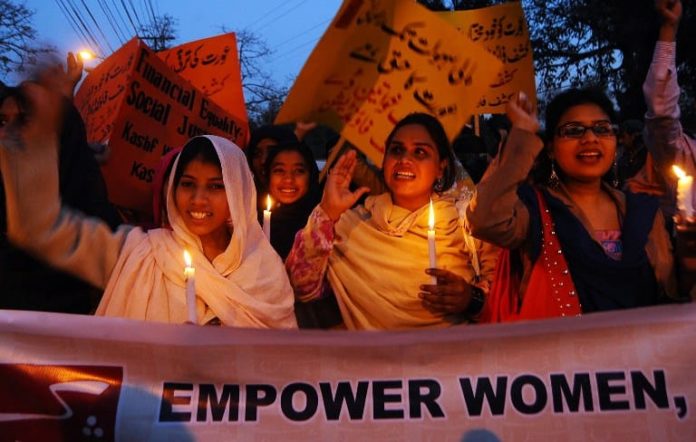The Twelfth of February by Rhonda Gossen – a former Canadian diplomat and academic – offers a fascinating study of the origins of women’s struggle against socio-political injustices in Pakistan. Browsing the book takes you on a journey back to the early and mid-80s when General Zia-ul-Haq lorded over Pakistan with an iron hand. The nascent Women Action Forum (WAF) and the Human Rights Commission stood up to brutal days of dictatorship when – led by (late) Asma Jehangir, Hina Jeelani and Shehla Zia, Fareeda Shaheed inter alia – these brave women rose to challenge the cunningly disguised religiously-disguised oppression Zia had launched.
Although the book recounts the Canadian contribution to the cause of women’s rights in Pakistan, it encapsulates the critical phases of women’s movements in the country, tracing critical events including the street protests that began with the introduction by the brutal dictator of the draconian Law of Evidence.
The book draws its title – 12 February – from the protests by WAF and the Punjab Women Lawyers Association in 1983 against the Law of Evidence and other discriminatory laws introduced at the time. This uprising for rights on 12 February 1983 thus remains a milestone in the evolution of women’s empowerment in Pakistan. It also laid the foundation of a movement that over the years has seen either new laws or improvements in laws related to the status of women, though the Zia-era legislation such as the Law of Evidence or Qisas Ordinance still exists.
While recounting how Canada helped women-focused initiatives to improve their lot, it also recalls how the country helped Pakistan establish its first nuclear power plant in 1965. The famous Warsak Dam on the Kabul River is Canada’s legacy infrastructure project in Pakistan.
However, Canadian support for women’s rights, gender equality, and civil society began in 1983 with assistance to women in development through the Aga Khan Rural Support Program.
The book is peppered with some disturbing images featuring women being subjected to violence by the police on the streets of Lahore and Islamabad.
Lots of Pakistanis can easily relate to these reflections from the 1980s even to 2024; then the police in Lahore were roughing up women protesting the discriminatory laws that reduced females to half citizens – as far as their fundamental rights were concerned.
Nearly four decades later, several female leaders and activists once again became the center of repression. The context this time was the aftermath of the arrest on May 9, 2023, of former prime minister Imran Khan; besides a plethora of dubious criminal cases against him, several leaders and party activists of his party faced a similar fate. Arrests, intimidation, raids on homes, and use of force on streets to deter them from protests – bore a marked resemblance to the suppression under Zia’s martial law – as if it was political modus operandi. Then it was Asma Jehangir, Hina Jillani, Fareeda Shaheed, Khawar, Mumtaz inter alia.
Then it centered on policy advocacy for equality. Today it is women that belong to an opposition party that is under duress. Dr. Yasmeen Rashid, Khadija Shah Sanam Javed, Aliya Hamza, and Arooba Komal are some of those female leaders and activists who are facing jail and criminal cases on trumped-up charges. Harsh jail conditions have failed to break these women.
Dr. Rashid, a cancer survivor, displayed remarkable grit to stand her ground and refused to shun Khan under duress.
“The founding of the Women Action Forum” in Karachi in 1981 symbolizes to many the birth of the women’s rights movement. It was an evolution from earlier groups fighting for women’s equality, such as the first fully-fledged women’s organization of Pakistan, the All-Pakistan Women’s Association (APWA), founded in 1949,” says the author.
The author, having spent years both in Pakistan and Afghanistan, candidly admits how the geo-political expedience of the West impacted not only the country but also its already disadvantaged female population.
“The fight for women’s rights and equality in Pakistan ……. cannot be separated from the war in Afghanistan and its impact on women’s rights and equality in Pakistan…. tracing the pattern of gender equality through the work of groups in Pakistan, supported by Canada under five consecutive women’s responsive funds beginning in 1985, sheds light on how the security situation impacted gender equality in the country, and in particular its impact on the majority of rural women.
Pakistan’s pivotal role in the anti-Soviet war in Afghanistan made it highly globally relevant and, for the Americans, a key ally, resulting in a surge of financial support from the US to the Pakistani military (Coll 2004) along with a six-year economic aid package. Nobody was bothered about the status of women, recalls the author quoting the American author Steve Coll.
In 2022, Pakistan regained its somewhat relevance for the US-led anti-Russia, pro-Ukraine campaign when the then army chief General Qamar Javed Bajwa publicly condemned Russia, unlike PM Khan who had refused to be a party to the conflict.
When a government is too preoccupied and distracted to prioritize development, social and economic development are usually accorded secondary importance to national security – an inevitable trade-off, says Ms Gossen.
The book is a must-read for all those interested in how a few brave women took up the fight for their rights under the worst military dictatorship. They indeed put the issue of the legal challenge to the status of Pakistani women on the agenda of the global media. A number of western nations including Canada stepped forward to help them amplify their voices across the globe. In the ensuing decades international support built up the pressure that was needed to either discard certain laws, abolish discriminatory regulations, or at least erecting legal bars to their indiscriminate application on women.
The Twelfth of February is indeed an excellent compendium of Pakistani women’s struggles for equal status as citizens.




